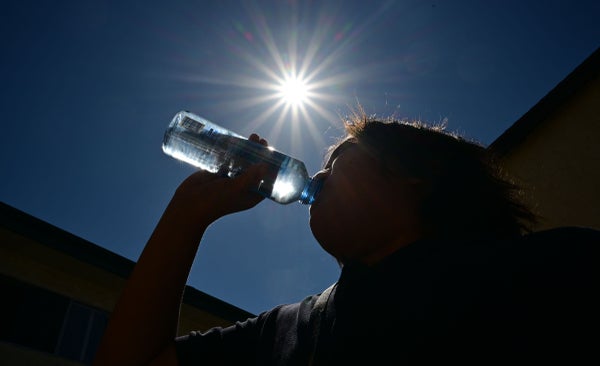CLIMATEWIRE | Heat-related cardiovascular deaths will more than double in the coming decades, disproportionately impacting older and Black adults, according to a new study from the National Institutes of Health.
Extreme heat currently accounts for less then 1 percent of deaths caused by heart disease. But climate change will increase the number of summer days with a heat index above 90 degrees Fahrenheit — and thus the number of fatal heart attacks, strokes and arrhythmias where heat plays a role, according to research published Monday in the medical journal Circulation.
Older adults and Black adults will be the most vulnerable as heat and humidity increases. That's in part because those populations are already at increased risk for underlying conditions like diabetes and heart disease. Those same conditions also make it more difficult for the body to cool itself down in the face of extreme heat.
On supporting science journalism
If you're enjoying this article, consider supporting our award-winning journalism by subscribing. By purchasing a subscription you are helping to ensure the future of impactful stories about the discoveries and ideas shaping our world today.
People who are Black or elderly are also more likely to live in homes without air conditioning, or in locations that can absorb and trap heat, known as “heat islands" — all of which makes them more vulnerable to heat’s heart impacts.
“The health burdens from extreme heat will continue to grow within the next several decades,” said author Sameed Khatana, a cardiologist at the University of Pennsylvania. “Due to the unequal impact of extreme heat on different populations, this is also a matter of health equity and could exacerbate health disparities that already exist.”
To reach their findings, Khatana and his team looked at county-level data from 48 states between May and September from 2008 to 2019. Of the more than 12 million people who died due to cardiovascular disease during that time, the researchers were able to connect 1,651 deaths to extreme heat and humidity.
The researchers then used modeling analysis to forecast environmental and population changes between 2036 and 2065 in the United States. As the number of days with a heat index above 90 degrees increases over that period, the researchers found, the annual number of heat-related cardiovascular deaths could reach 4,320.
The projections were more stark for older and Black adults. Heat-related cardiovascular deaths could nearly triple for adults aged 65 and older, while those deaths would more than triple for Black adults.
The study notes that one reason those populations face increased risk is because their communities and neighborhoods have historically faced discrimination and suffer from a lack of infrastructure investment. Implementing heat mitigation strategies in such communities — by increasing the tree canopy, for example, to offset the heat island effect — could help people stay healthy in a warming world, the authors wrote.
"The number of cardiovascular events due to heat affects a small proportion of adults, but this research shows how important it is for those with underlying risks to take extra steps to avoid extreme temperatures," said Lawrence Fine, a senior adviser at NIH's National Heart, Lung and Blood Institute.
Reprinted from E&E News with permission from POLITICO, LLC. Copyright 2023. E&E News provides essential news for energy and environment professionals.
